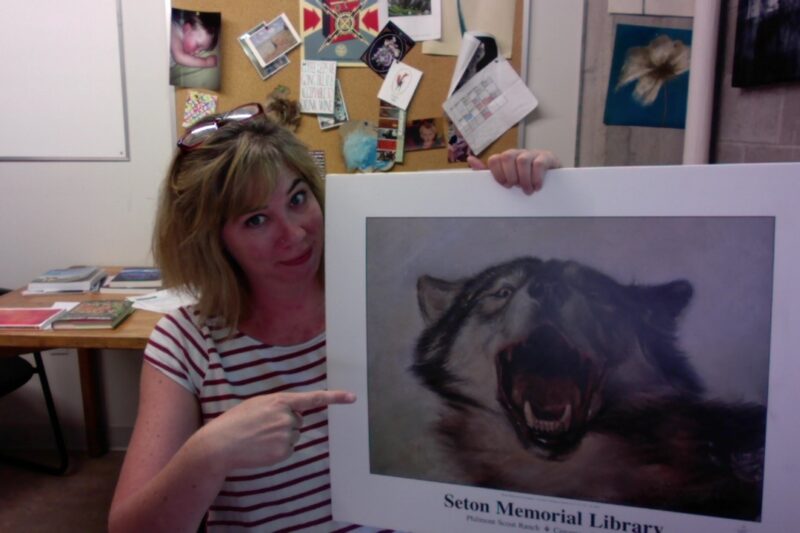The University of St. Michael’s College is proud to announce that we have reached our target of fully divesting from fossil fuels five years ahead of schedule. As of Friday, April 25, 2025, the university had absolutely no investment exposure to fossil fuels.
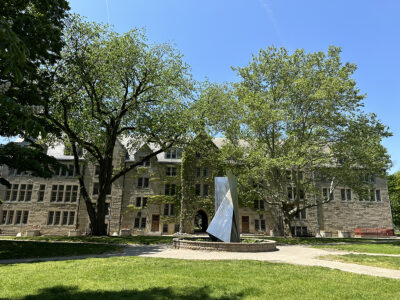
Collegium, the university’s governing body, identified 2030 as the target date for full divestment at its June 2023 meeting, the same date the University of Toronto had selected in 2021 for itself.
“The Collegium’s decision to begin divesting St. Michael’s from fossil fuels was an institutional response to the urgent need to care for all creation, inspired by the university’s Mission Statement,” says Chair Susan Helstab. “As an alumna and trustee, I am proud that USMC has led by example and will inspire conversation and action at other Catholic and higher-education institutions.”
The decision marks a significant moment in the university’s history, says St. Michael’s President David Sylvester.
“Sustainability is one of the three pillars of St. Mike’s 180, our strategic plan,” says Sylvester. “By moving away from investing in fossil fuels we want to demonstrate to stakeholders that we see sustainability not just as a goal but as a principle that guides our lives. This accomplishment is good for our students, good for our university and good for the broader community.”
St. Michael’s Collegium Investment Committee has been consistently focused on environmental, social and governance (ESG) standards since the committee was struck in 2012, notes committee chair Michael Binette.
“It’s in our DNA to be highly sensitive to ESG,” says Binette, who cites a variety of powerful influences on the committee, from the Sisters of St. Joseph through to former committee member Mary Ann Leon, who is particularly passionate about divestment and ESG, he says.
In 2013, St. Michael’s ceased to have direct investments in fossil fuels when the committee advised a move to invest in pooled funds instead. In time, the university engaged SHARE, the Shareholder Association for Research and Education, and UNIE, an investor network for university pension plans, foundations and endowments, to examine ESG matters in companies in which St. Michael’s was invested via the pooled funds.
Collegium committed in 2023 to complete fossil fuel divestment, in part influenced by increasing student interest. There was also, however, the profound influence of Laudato si’, Pope Francis’s 2015 encyclical on the environment, as well as the university’s strategic plan. Released in 2021, the plan asserts that “St. Michael’s will commit to orient itself proactively and lead as an institutional that is dedicated to social justice and sustainability, whether environmental, social or financial.”
With the commitment in place, the Collegium’s Investment, Finance & Audit, and Executive committees began assessing the risks and benefits of divesting, and a memo was drafted which promised maintaining an “overall responsible investment approach” that would incorporate ESC considerations.
“We did our homework,” Binette says of the committee’s search for pooled funds that did not include fossil fuels but that offered returns appropriate for the university’s needs. Only a limited number of such funds were available, and the committee rated them on issues such as track record, returns and history. “We were knowledgeable and in a good position.”
“This choice … reflects a strong commitment to the college’s core values of respectful dialogue, ethical responsibility, and the courage to take meaningful action in the face of complex challenges,” says Elizabeth Xu, the voting member student representative on Collegium. “What makes this action especially impactful is the example it sets for students—the next generation of world changers. It sends a clear message about the power of education to create impact beyond oneself and contribute to meaningful, global change.”
The move to full divestment is the latest step in St. Michael’s long commitment to environment and sustainability issues. A prime example is the establishment of the world-renowned EIliott Allen Institute for Theology and Ecology (EAITE) in 1991 to facilitate ecumenical and interdisciplinary scholarship to cultivate practices for an inclusive, just and ecologically sustainable society.
“St. Michael’s decision to divest from fossil fuels is a profound act of faith and justice. As Laudato Si’ reminds us, everything is interconnected—our economy, the earth, and the well-being of the most vulnerable,” says Professor Hilda Koster, who holds the Sisters of St. Joseph of Toronto Chair in Theology at the Regis St. Michael’s Faculty of Theology and is director of the EAITE. “Pope Francis called us to respond to the cry of the earth and the cry of the poor, and this step reflects our commitment to shaping a future rooted in ecological responsibility and moral integrity. It’s a powerful witness to the kind of world we believe is possible.”
In 2023, Regis College and the University of St. Michael’s College were officially designated Blue Communities, joining in a project that encourages municipalities to protect water as a human right and public trust, and to promote public water over bottled water. St. Michael’s College Student Union (SMCSU) paid to install fillable drinking water stations across campus.
As well, the university’s facilities department continues to focus on efforts to make St. Michael’s infrastructure more environmentally friendly, for example installing energy efficient windows and timed faucets and light fixtures to reduce waste and save energy.
One of the sustainability goals stated in St. Mike’s 180 is to “embed environmental and social responsibility into all university operations, urging community members to do the same.”
Fossil fuel divestment is an important sign of living up to that promise.
On June 14, 2023, the Collegium of the University of St. Michael’s College committed to fully divest the University’s investments from fossil fuels by the year 2030, or sooner if possible.
The University of St. Michael’s College (USMC) has held no direct investments in fossil fuel companies since 2013, and the Collegium’s decision will complete the process of removing fossil fuel companies from its indirect investments (pooled and commingled funds).
Complete divestment from fossil fuels builds on USMC’s established initiative of investing according to its institutional values. Since 2016 USMC has collaborated with the Shareholder Association for Research & Education (SHARE) to support and encourage more just and humane environmental, social, and governance practices among investees. In 2021, USMC joined a coalition of Canadian universities to launch SHARE’s University Network for Investor Engagement (UNIE), which engages corporations on climate change risks.
“The Collegium’s commitment to full divestment from fossil fuels represents an important next step on a journey this university has been on for over thirty years,” said President David Sylvester. “St. Michael’s has been a forum of ecological thought and practice since the founding of our Elliott Allen Institute of Theology and Ecology in 1991. The Collegium’s decision resonates powerfully with that tradition, and with our university’s vision to be a recognized leader in promoting respectful dialogue and action to advance the care of our common home, as articulated in our strategic plan, St. Mike’s 180.”
Learn more about St. Mike’s sustainability initiatives.
Just ahead of Earth Day, the University of St. Michael’s College achieved the designation of “Blue Community,” committing to protect water as a human right and public good. St. Michael’s joins Regis College and the Sisters of St. Joseph to adopt a seven commitment “Blue Community Pledge.”
Speaking at the Blue Communities launch event, St. Mike’s president David Sylvester noted that becoming a Blue Community is “in keeping with the university’s long-standing commitment to social justice,” as outlined in the St. Mike’s 180 strategic plan, and in direct response to Laudato si’ and Fratelli Tutti’s call to establish new relationships with the environment and with all humanity.
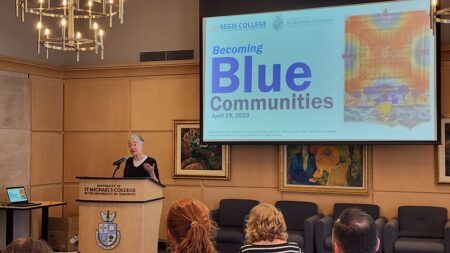
Water justice activist and author Maude Barlow applauded the decision, thanking both St. Mike’s and Regis for being part of what she likes to call “ushering in the age of nature.”
St. Michael’s is joining a growing group of universities in Canada to protect what Pedro Aroyo, UN special rapporteur on the human rights to clean water and sanitation, calls the “blue soul of water.”
As a Blue Community, St. Mike’s pledges to help protect the planet’s water and promote the human rights to water and sanitation by upholding the following principals:
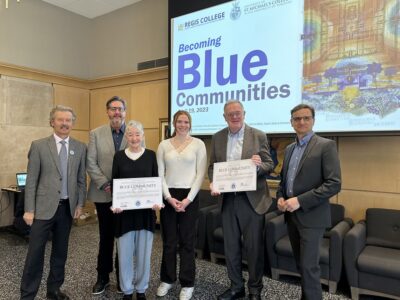
- Recognize water and sanitation as human rights
- Educate the community about the human rights to water and sanitation
- Ban the sale of bottled water on campus and at sponsored events
- Educate community members and partners to avoid using bottled water where potable water exists
- Uphold a “water commons” framework in which water is a shared responsibility of all
- Encourage the responsible use of tap water through capital improvements and programming
- Urge community members and other post-secondary institutions to advocate for sustainable water policies worldwide, giving particular attention to the rights of marginalized groups, communities, and Individuals.
Barlow was joined by other members of the Council of Canadians including Board Chair John Cartwright, Executive Director Ravi Josh and Water Campaigner Mark Calzavara to formally recognize the designation.
To learn more about Blue Communities, please visit https://canadians.org/bluecommunities/
Rosemary Boissonneau is a climate justice activist and a doctoral student at St. Michael’s Faculty of Theology, where she studies ecotheology and scripture. Her research involves applying ecofeminist and decolonial methods to the interpretation of Old Testament texts in order to retrieve an understanding of the land as an active participant in the covenant with God and the people of Israel. Before embarking on graduate studies, Rosemary enjoyed a long career as an elementary school French teacher.
This Friday, April 22 marks Earth Day, an event that has grown into global prominence since its first iteration 52 ago during the heady days of the U.S. college protest movement. Now recognized as the largest secular observance in the world, Earth Day is commemorated by over a billion people each year as a day of action centred on our planet’s well-being and its protection from human-induced degradation and destruction. Residents in over 190 countries use this day to raise awareness about pressing environmental challenges and demand the individual behavioural changes and the multi-level policy changes that are needed to stop the damage we are unleashing on the Earth.
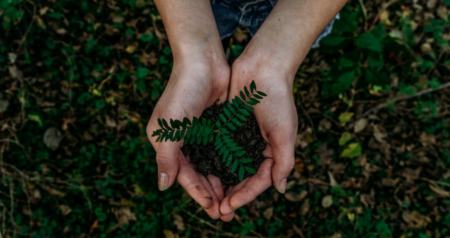
Occurring during spring and the Easter season, Earth Day ought to be a celebration of renewal and hope but, increasingly, it is an occasion for lamentation, despair and desperation as year after year the cries of environmentalists and the Earth itself seem to go unheeded, and the devastation of the planet continues at an ever more rapid pace. The interrelated crises of biodiversity loss, ecosystem collapse and climate change pose an unprecedented threat to the health of the planet. Referring to the most recent report of the International Panel on Climate Change (IPCC) released earlier this month, the UN Secretary-General, António Guterres, warns that without drastic reductions in global greenhouse gas emissions in the next few years, we are “firmly on track to an unlivable world” thanks mainly to “a litany of broken climate promises” by governments and corporations still banking on the fossil fuel economy and blocking efforts to enact a just transition to a decarbonized future.
And yet … despair need not have the final word. There is still reason for hope on this Earth Day. The same IPCC report details how, if the global community takes immediate and significant action using existing technology and methods, it can still keep the Earth within the 1.5C degrees of warming as pledged in the 2015 Paris Accord and avoid the worst of the impending climate catastrophe. For an overview of the many initiatives and behavioural changes that we must undertake or ramp up to achieve net zero emissions, take a look at the list of the climate solutions and their many social co-benefits outlined by Project Drawdown at https://drawdown.org/ . As you will see, these solutions respond to both the cry of the Earth and the cry of the poor.
The future can be bright, healthy and equitable! Alleluia! However, none of these positive paths forward can take effect until we humans first experience what Pope Francis’ encyclical Laudato Si’ calls an “ecological conversion.” This is especially true for those of us living in the so-called developed global North, where our normative worldview understands humanity to be separate from and superior to the rest of creation. If we remain stuck in this anthropocentric mindset, even our most noble efforts to “save the planet” this Earth Day will lead to failure. Because the truth is we humans cannot single-handedly save the planet even though we are in the process of single-handedly destroying it.
The Earth is not a damsel in distress waiting for us humans to save it. The Earth is the regenerative, creative, living masterpiece of God’s creation, which has been creating, regenerating and regulating the dizzyingly diverse array of life in its biosphere for many millions of years, since long before humans emerged as one of the most recent members of God’s community of creation. As Laudato Si’ reminds us, “Rather than a problem to be solved, the world is a joyful mystery to be contemplated with gladness and praise.” If we enter mindfully into the mystery of creation, the living embodiment of God’s love, we humans can learn how to collaborate with the Earth and its regenerative powers, how to live and indeed thrive within its means, so that we can unlearn and cease the destructive activities and attitudes that are preventing the Earth from saving itself, and saving us humans along with it.
Fortunately, none of this is new. Before modernity and before we developed our unquenchable thirst for empire-building, we humans more or less knew how to live in right relationship with the rest of the community of creation. And Indigenous peoples continue to live out the knowledge and wisdom intrinsic to such relational ways of being despite the genocidal brutality of colonialism past and present. In fact, as a hopeful sign of our growing recognition of this reality, the latest IPCC report for the first time ever listed colonialism as a historical and ongoing driver of climate change, suggesting that the paths of decolonization and decarbonization are united. This view is echoed in the final document from the Synod on the Amazon released in 2019. It recognizes that being attentive to the cry of the Earth and the cry of the poor, especially the Indigenous peoples of the Amazon, calls us to “a personal and communal conversion which commits us to relate harmoniously with God’s work of creation.” It also acknowledges that this conversion involves honouring “the pattern of thinking of indigenous peoples [that] offers an integrated vision of reality, capable of understanding the multiple connections existing throughout creation.”
On this Earth Day we must not remain blind to the grave threats that imperil our planetary home, but neither should we disregard that the Earth itself is humanity’s formidable and wonderous ally on our path of conversion toward ecological and social healing. I will conclude with advice from Laudato Si’. On this Earth Day, “let us sing as we go. May our struggles and our concern for this planet never take away the joy of our hope.” To learn more about Laudato Si’ and St. Michael’s ecotheology offerings, please visit the Elliott Allen Institute for Theology and Ecology.
Read other InsightOut posts.
In this story from the Spring 2021 President’s Report, Chief Administrative Officer Effie Slapnicar discusses how St. Michael’s involvement with UNIE reflects the way sustainability is being woven into all aspects of the College’s culture.
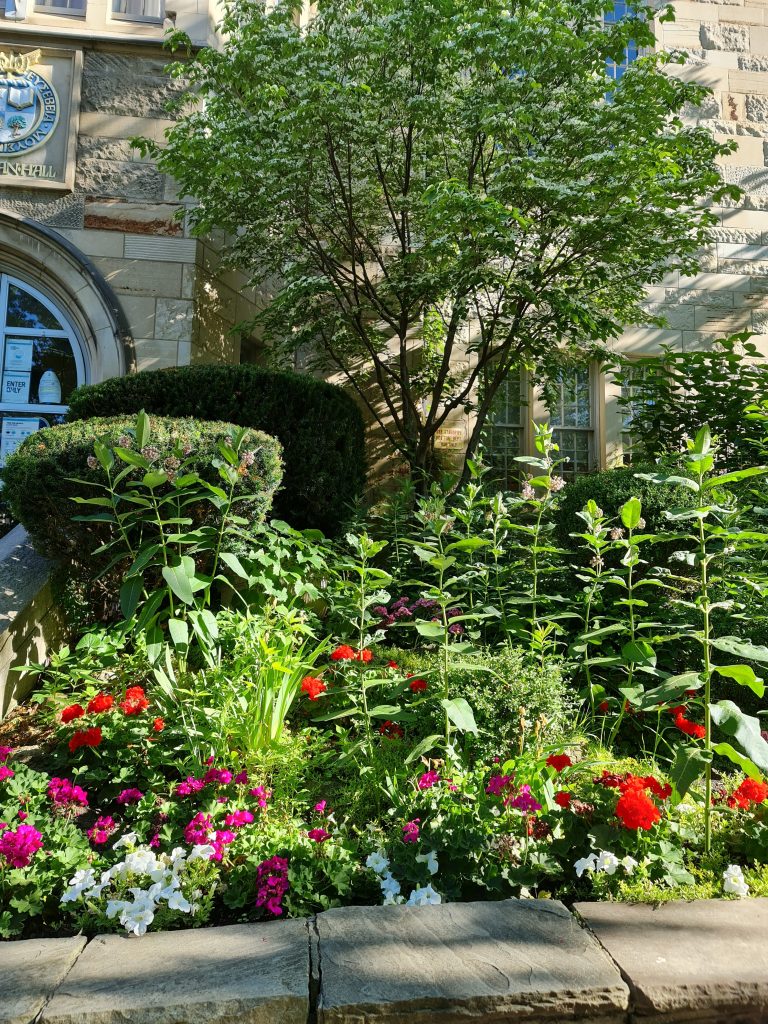
The University of St. Michael’s College knew it was a wise fiscal move to become a member of the Shareholder Association for Research & Education (SHARE). Belonging to the non-profit investor advocacy organization, which St. Mike’s joined in 2016, seemed a good way to prioritize sustainability and climate justice in the university’s investing strategy while building relationships with like-minded institutions.
What hadn’t fully been anticipated, says Effie Slapnicar, St. Michael’s Chief Administrative Officer, was the degree to which conversations about ethical investing would have trickle-down effects on the community, prompting much broader conversations and initiatives about sustainability initiatives across the university.
“Belonging to SHARE is a good way for us to use investments to advance the ESG (Environmental, Social and Governance) issues we want to raise,” says Slapnicar, who says an E, S & G committee was struck at St. Michael’s in 2017 to review quarterly reports generated by SHARE, as well as to discuss related questions. “Often people think that you need to sacrifice earnings to make a change, but SHARE serves as a mediator, allowing us a seat at the corporate table to raise environmental and social concerns we have. We are maintaining healthy returns while also addressing questions of sustainability.”
Now, St. Michael’s has gone a step further and become a charter member of the University Network for Investment Engagement (UNIE), a collective of Canadian universities under the SHARE umbrella whose role is to engage corporations on questions of reducing greenhouse gas emissions and pursuing sustainable finance, responsible climate policy, and just transitions through the initiative.
“We believe that collectively, with other Canadian universities participating, we will have a stronger voice in areas of climate change that are important to our community,” Slapnicar says. “As shareholders, we have the opportunity to use our position to influence corporate behaviour, and together with our colleagues across Canada we want to use that influence to accelerate Canada’s transition to a zero-carbon economy.”
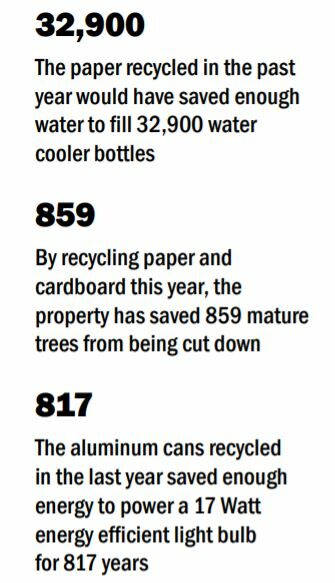
UNIE, which involves a number of stakeholders, including York, McGill, McMaster, and Carleton universities, will focus both on reducing greenhouse gas emissions and accelerating the transition to a low carbon economy.
“These universities are showing leadership in addressing the climate crisis. Working together in one program amplifies each institution’s voice and leverages their power to bring about change,” says Kevin Thomas, Chief Executive Officer at SHARE.
While ongoing financial fitness is a critical factor in ensuring the long-term health of St. Mike’s, the ESG Committee also discusses more local issues.
“We often find ourselves asking what we can do in our own backyard (to promote sustainability) and what we can control,” Slapnicar says. “We have a responsibility not only to our current students but to our future ones, too, as well as to many, many other people, including all those who see our beautiful campus as an oasis in the middle of a big, bustling city.”
“Sustainability is important to us and it affects how we approach things. For example, it influenced our hiring of Director of Facilities Michael Chow, as he really understands sustainability and has an eye for projects while also appreciating the need to work within a limited budget,” she says.
Duncan Buttenshaw, St. Mike’s new Director of Finance, is another example of how our environmental and social goals are reflected in our hiring, Slapnicar says, noting that Buttenshaw is in the final stages of his MBA with a specialization in Social Impact from the University of New South Wales.
Now, as the university eyes such issues as more efficient recycling and environmentally friendly furniture and supplies, it also thinks about its procurement policy as a way to enhance St. Mike’s social impact. For example, a company that embraces diversity might be given added points in the procurement process, she notes.
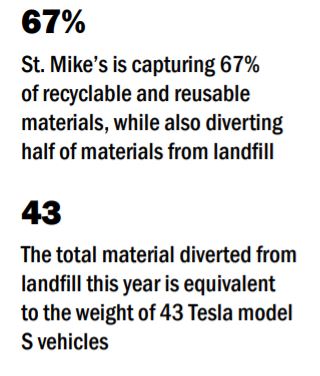
As an example, Slapnicar notes that when the university was looking at new furniture for the recently renovated Brennan Hall, the original plan was to order from the United States. But when it became apparent the order would be delayed, the university found Canadian-made furniture, saving money and cutting the environmental toll of a long delivery haul, an idea now being actively embraced.
“It’s astounding the way sustainability is being woven into the culture here,” says Slapnicar, who says it fits with a community she finds to be “consultative.”
“Who better to ask than the people on the front lines? Often I will hear a senior manager respond to a discussion by saying, ‘I’ll need to consult my team and get back to you’ and then the person will return with great ideas because the community cares and is always ready to help,” she says, noting the additional value of staff feeling appreciated, knowing their ideas are valued and acted upon.
“Our campus reflects the past and the future and we are respectful of that,” she says. “We know both the students and the broader community value our grounds, so we respect the heritage aspect while always working with an eye to a more beautiful, efficient campus. We are so excited about the changes coming.”
From University of St. Michael’s College President’s Report, Spring 2021
Dr. Hilda P. Koster is an Associate Professor of Theology and Director of the Elliott Allen Institute for Theology and Ecology.
Of Heatwaves, Floods and Climate Change—Our Kairos Moment
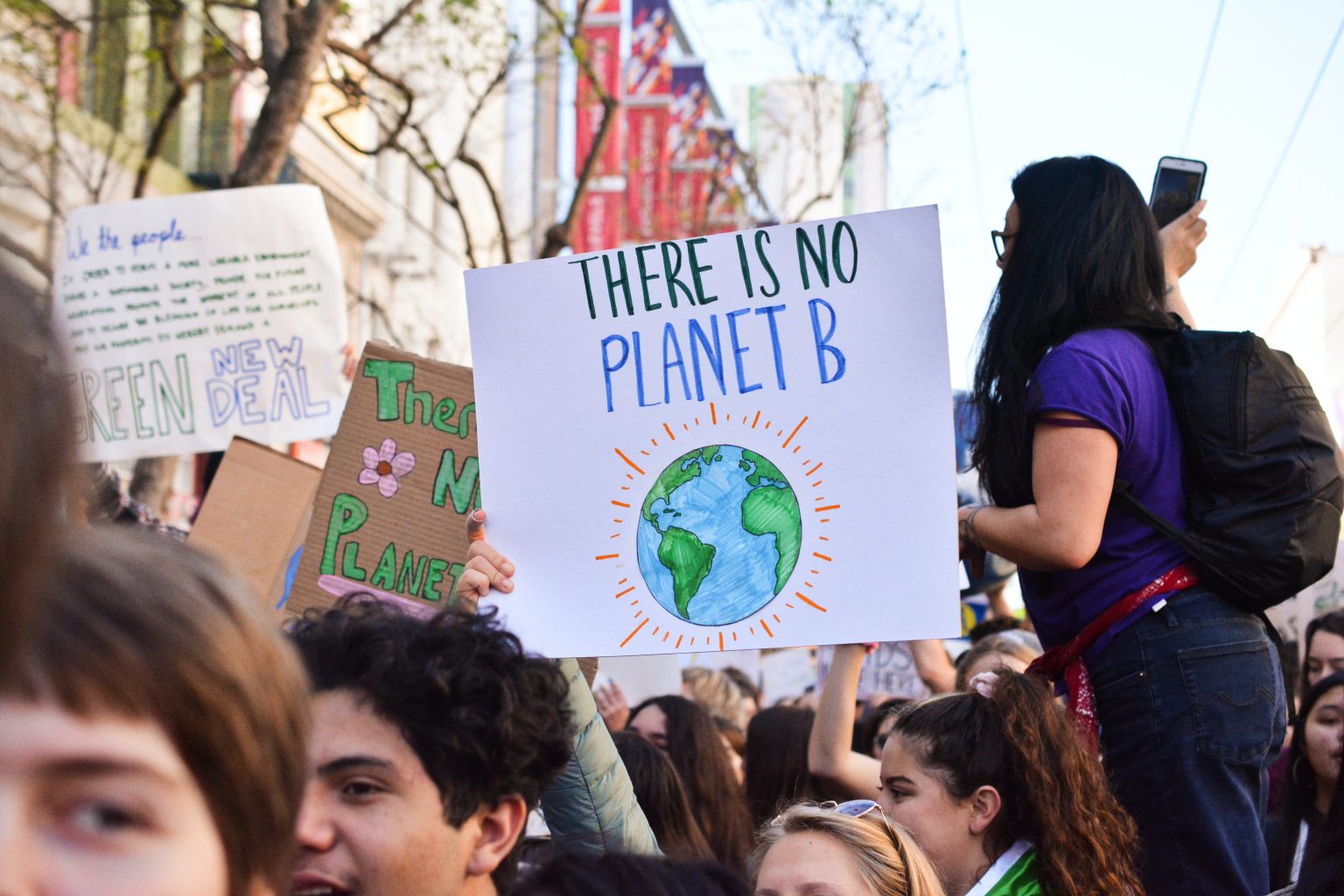
What could have been a summer of cautious optimism about life post COVID-19 has unfortunately become a summer filled with climate change-related horrors. Wildfires due to the record-breaking temperatures and a prolonged drought in the Pacific Northwest took human life and destroyed homes. It also ravaged thousands of acres of forest and seriously endangered marine wildlife. In Northern Europe, including in my native country, The Netherlands, torrential rains caused unprecedented flooding and mudslides. In South Madagascar, off the coast of East Africa, the worst drought in four decades is driving more than a million people into famine.
While the connection between climate and weather is complex, climate scientists agree that the heat waves and rains of this past summer are clearly linked to anthropogenic changes to the climate. What has scientists alarmed, however, is not that there is a connection between extreme weather events and climate change but that these events have been so severe and prolonged. Harvard environmental policy professor John Holdren, who served as senior adviser to former U.S. President Barack Obama, observes that “[e]verything we worried about is happening, and it is all happening at the high end of projections, even faster than the previous most pessimistic estimates.” (Los Angeles Times, July 21). The world truly is running out of time and many people seem to sense this.
The Ecumenical Patriarch Bartholomew has called the climate crisis a Kairos moment for our churches and the world: “For the human race as a whole there is now a Kairos, a decisive time in our relationship with God’s creation. We will either act in time to protect life on earth from the worst consequence of human folly, or we will fail to act.” (Closing Address to Symposium on the Arctic, 2007). The Greek word Kairos means the right or opportune moment. From a theological perspective Kairos indicates that time takes on a holy urgency. Time is no longer simply linear time, stretching open towards the future. Instead, it becomes critical to act. Calling climate change a Kairos moment thus marks the present as a moment of truth and opportunity; a moment where our collective response will have far-reaching consequences.
This fall the eyes of the world are on the 26th UN Climate Change conference in Glasgow (Scotland). COP26 is meeting with the urgent task to implement the climate commitments of the 2015 Paris Climate Accord, which seek to limit the increase of the planet’s temperature to 1.5 degrees Celsius. The question before us then is whether the world community (especially the world’s wealthiest nations) can seize the moment of pandemic recovery as an opportunity to enact the necessary climate policies. For if we fail to grasp this moment and do in fact return to pre-pandemic rates of fossil fuel emission the world could be 1.5̊ Celsius hotter than it was prior to the industrial revolution as soon as 2030 and on track for much higher temperatures.
It is tempting to be skeptical about international climate conferences. After all, the world has passed many climate thresholds since the first UN climate conference in 1992. Climate change, however, is not just a political challenge; it is also a theological and spiritual one. In fact, our response to climate change touches upon the very core of Christian witness. For according to the Biblical tradition, God did not just create the world but also called it good. The Hebrew word for good, tov, means more than “good.” It implies a goodness that is life furthering, a life-generating capacity. Human induced climate change does not just go against this life-furthering capacity but is also undoing it. For those of us living in climate privileged communities, despair, resignation, or indifference are therefore not an option. Instead, we are called, in Pope Francis’ words, to an ecological conversion —that is, a change of heart in the way we look at, interact with, and behave towards the more-than human world with which we are entangled and on which we depend.
Kairos language keeps open the possibility of such an ecological conversion. It is stubbornly hopeful. In the Book of Revelation, John of Patmos sketches doomsday scenarios that eerily resemble those of our day. Yet with all its woes, Revelation does not foreclose the possibility of repentance (metanoia) and turning around. According to the New Testament scholar and eco-theologian Barbara Rossing, the catastrophes depicted by John are neither willed by God nor follow a cosmic destiny. In Revelation, God laments the state of the earth yet places the Christian community at an ethical crossroad (a Kairos moment) where it needs to choose between the polluting, death-dealing powers of Rome/Babylon or God’s New Jerusalem. While time is of the essence, John holds out the hope that the world will listen to the witnesses he so powerfully invokes towards the end of his book. It is significant, too, that Revelation ends with an attractive vision of the tree of life. There is no return to Eden, but there is a vision of what is possible. A vision rooted in the beauty and resilience of planetary life and in practices of an alternative political ecology, symbolized by the city-garden.
Many have heeded Pope Francis’ call for an ecological conversion. This September several religious communities and interfaith groups are embarking on a pilgrimage to COP26. They are visionary witnesses. Those of us outside the United Kingdom and Scotland are invited to add our own witness by walking to a special place or spot near us, posting our pictures and messages #Walkingtheland2021. Our messages will be collected and shared with delegates at COP26. In a time such as this, a time in which the world is running out of time, I invite all of you to participate in the Walking the Land project at https://www.pilgrimagefornature.com/walking-the-land and add your voice, dreams and hopes for our life together on this fragile planet.
Read other InsightOut posts.
The University Network for Investor Engagement (UNIE) initiative targets greenhouse gas emissions and climate risk at companies across the economy
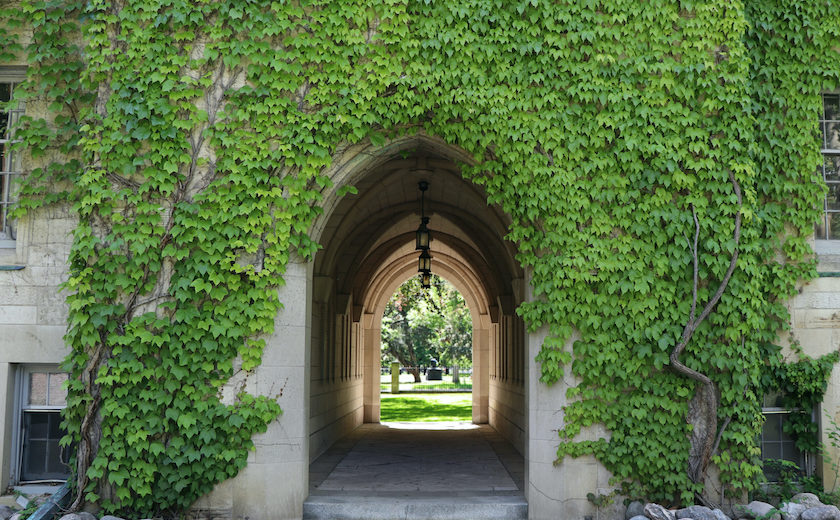
The University of St. Michael’s College has joined a coalition of other Canadian universities to launch the University Network for Investor Engagement (UNIE), an initiative that will engage investee corporations on climate change risks.
“We see supporting the UNIE initiative as an expression of care for our common home, which Pope Francis calls us to in Laudato si’,” said St. Michael’s President David Sylvester. “Pursuing financial resilience, strengthening community partnerships, and embedding social responsibility into all our operations is essential to St. Michael’s mission as a Catholic university.”
UNIE is being launched through the Shareholder Association for Research & Education (SHARE), a non-profit investor advocacy organization. St. Michael’s first became involved with SHARE in January 2016 as a way to prioritize sustainability and climate justice through its investing strategy while building relationships with like-minded institutions. The first meetings of St. Michae’s Environmental, Social, and Governance (ESG) committee took place the following year.
In concert with other universities engaging their investment portfolios, St. Michael’s stands to make an impact in the areas of reducing greenhouse gas emissions and pursuing sustainable finance, responsible climate policy, and just transitions through the initiative.
“We believe that collectively, with other Canadian universities participating, we will have a stronger voice in areas of climate change that are important to our community,” said Effie Slapnicar, St. Michael’s Chief Administrative Officer. “As shareholders, we have the opportunity to use our position to influence corporate behavior, and together with our colleagues across Canada we want to use that influence to accelerate Canada’s transition to a zero-carbon economy.”
On behalf of the University Network for Investor Engagement (UNIE) initiative, SHARE will engage with North American public companies held in university endowment and pension portfolios to address pervasive risks associated with climate change. The UNIE initiative will focus on key sectors where advocacy can make the biggest difference, including finance, transportation, energy and utilities, and manufacturing.
In addition to St. Michael’s, initial participants include Carleton University, Concordia University, McGill University, McMaster University, Mount Alison University, Université de Montreal, University of Toronto Asset Management, University of Victoria, and York University.
“These universities are showing leadership in addressing the climate crisis. Working together in one program amplifies each institution’s voice and leverages their power to bring about change,” said Kevin Thomas, Chief Executive Officer at SHARE.
The UNIE initiative is focused both on reducing greenhouse gas emissions and accelerating the transition to a low carbon economy.
“The actions taken by institutional investors today will play a crucial role in determining how society fares in the face of climate change,” said Thomas.
Dr. Stephanie Rutherford is an alumna of St. Michael’s College (BA 1997) and is now an Associate Professor in the School of the Environment at Trent University. Her work is interdisciplinary, focusing on the intersections among the environmental humanities, animal studies, and cultural geography. She is the author or co-editor of three books that consider these themes, the most recent of which is Historical Animal Geographies (2018). She is currently writing a new book on the history of wolves in Canada for McGill-Queen’s University Press. You can learn more about her work here.
Letting Go of the Treadmill of Productivity; Or How to Finish a Book in a Pandemic
The book was already late when the pandemic hit. Of course, being late is nothing new to most academics; we are often scrambling to meet—and missing—writing deadlines. Teaching and administrative work often take precedence during the term; bite-sized articles seem more doable over big projects.
But this was a big project that needed finishing. I’ve been working on this book about wolves for about eight years now. Eight years is a long time for any project; it starts to feel like it’s strangling you. The funding has elapsed. People keep asking when the book is going to be done. I started to be called the wolf lady, and not just behind my back. It was time to move on.
Last year I decided it was a good idea to seek a book contract to impose a deadline since I couldn’t seem to meet my own. It seemed like a smart thing to do—adding pressure from an outside source—as if the reason I hadn’t completed the book was out of slothfulness instead of being pulled in a variety of academic and administrative directions. It’s the curse of academia: you are never doing enough, publishing enough, or reading enough. It’s a feeling bred in PhD programs that lasts throughout your career, if you let it. Shame is not only the purview of my Irish aunties; it’s also the handmaiden of neoliberal academic life.
So, I got my contract and I had a June 2020 deadline. Then the pandemic hit. My 9-year old started school from home and in many ways that became my full-time job and my actual job began happening in smaller chunks and much later at night.
Of course, this has been the reality for many parents, and the effects can be quite gendered. For instance, there have already been a fair number of stories about how women academics have slowed their research output while men have sped theirs up during COVID. Guiliana Viglione in a Nature article tells us women are starting fewer new projects. Diane Peters in University Affairs writes that women’s research has been “squeezed” by the pandemic. I have received invitations to complete three surveys meant to measure my own gendered lack of productivity, which have only succeeded in making me feel that the authors of these surveys are much more productive than I am. My fabled life of the mind has been replaced by the life of “Mom, can I have a snack”? So it goes.
But I have discovered, amid a fair amount of frustration, that I can work in new ways to accommodate our present reality. They aren’t ideal; right now, I often write in short chunks, bookended by swims and bike rides with the best kid I know. And I’m lucky. I don’t have to do this while worrying about my job, or my partner’s job. It also helps that I have the security of tenure. My research can be put on hold in ways that more precarious faculty could never consider. Neoliberal academia once again.
But I’ve realized something that feels significant in my own understanding of the kind of academic life I want to lead. If my project was new, this approach wouldn’t be tenable. It seems those eight years of researching and pondering might, in this strange time, be an advantage rather than a liability. Put differently, maybe it pays a little to be late (don’t tell my mom) and engage in a kind slow scholarship, one that allows for a capacious openness to the kinds of ideas that might sometimes be missed when the treadmill of academic production has to be so very fast. At the very least it allows you to dig deep. In this way of thinking, instead of too long, eight years might seem like just about the right time, at least for me and at least with this project. The pandemic graced me with the ability to let go of the shame that goes with an obsessive emphasis on academic productivity, and embrace being present for myself and my family, as well as my work. In doing so, I learned to love those wolves again, which is really how this whole project started.
It turns out that letting go of that shame was perhaps just what I need to do. Just before writing this short reflection, I completed the draft of the book, late again but done this time. It feels great; it’s time for someone else to worry about it. So now I’m going to go enjoy another swim with my kid, because as Rabbi Harold Kushner famously noted “No one ever said on their deathbed ‘I wish I’d spent more time at the office’.”
Read other InsightOut posts.
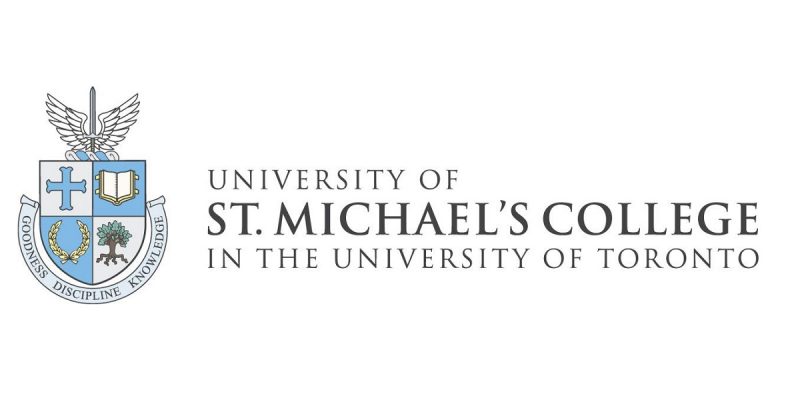
TORONTO, Oct. 23 – Four projects demonstrating the impact of business and governments’ Social Responsibility and Sustainability practices on youth mental health, Truth and Reconciliation, municipal CSR engagement, and the real estate sector have earned nominations for the inaugural USMC President’s Capstone Project Award for the Graduate Certificate in CSR/Sustainability.
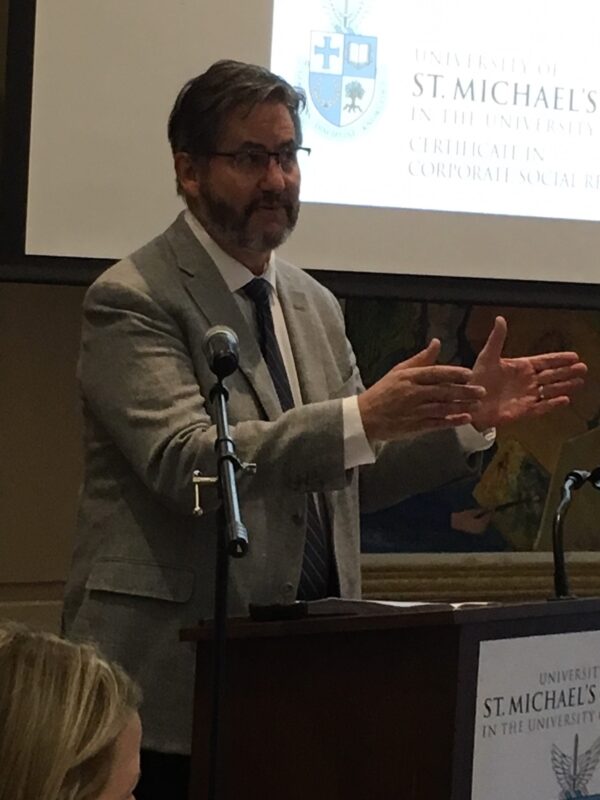
The nominated projects are:
- “Stand Up! For Youth Mental Health: Will Community Investment Pay Off for Family Channel?” by Nikki Byrne
- “Indigenous Impact Report” by Alexandra Biron
- “Bringing to Life a CSR/Sustainability Conversation for the City of Mississauga” by Andrea McLeod
- “A CSR Strategy for the Canadian Real Estate Association” by Sarah Thirnbeck
“The Corporate Social Responsibility program is a vital offering at the University of St. Michael’s College, helping business and institutions focus on ways to become better – and more effective – global citizens, whether environmentally, socially, or economically,” says St. Michael’s President David Sylvester. “Program participants return to their workplaces as leaders engaged in social impact that benefits their employers and society. We want to celebrate these extraordinary changemakers with this new award.”
Thirty participants are accepted annually to St. Michael’s CSR program, which attracts students from across Canada and around the world from sectors as diverse as banking and manufacturing to education and NGOs. Participants meet on campus for three sessions over a 13-month period and connect online throughout the program, engaging in readings, webinars, videos, and shared reflections on ethical behaviours that create shared value that contributes to society’s wellbeing. The summative capstone assignment sees participants work with a mentor from their field on a project to apply knowledge, skills and perspectives learned or honed during the program.
Projects considered for the President’s Capstone Award must be distinguished in what they achieve or propose in one or more of the following criteria: 1) advancing social and/or environmental impact; 2) introducing innovative practices in social and environmental responsibility, sustainability, ESG and/or 3) significantly advancing social and environmental responsibility, sustainability and/or ESG to the creator’s organization.
Nominated projects were judged by a panel which includes Kaz Flinn, Chair, St. Michael’s advisory committee for the CSR program; Dr Stephen Scharper, associate professor at the School of the Environment and the Department for the Study of Religion at the University of Toronto; and Mary Ann Sayers, a graduate of the CSR program and senior business consultant at West Pine Consultants Inc. For more information, please see the Certificate in Corporate Social Responsibility/Sustainability Website.
About the University of St. Michael’s College
The University of St. Michael’s College (USMC), federated with the University of Toronto, is a Catholic institution of higher learning founded by the Congregation of St. Basil, whose motto, “Teach me goodness, discipline and knowledge,” sets the tone for campus life.
A Business Advisory Committee ensures the CSR program is relevant and experiential. CSR/Sustainability Leaders representing a broad range of industries from insurance to mining, including: The Co-operators, BMO Financial, Scotia Bank (ret.), Vermillion Energy, Centerra Gold , ESG Ledger, Conference Board of Canada, and Rotman School of Management (University of Toronto) provide advice and input.
For More Information Contact
Kathryn A. Cooper, Program Manager, Certificate in Corporate Social Responsibility & Sustainability
Phone: (519) 855-9491
Website: https://www.csr-stmikes.ca/
Sustainability, Social Responsibility and related ESG job opportunities are on the rise. Millennials and Gen Z want purpose in their lives. And sustainability and social responsibility is transitioning to be strategically embedded in organizations. New skills and practices are in critical demand for today’s CSR & Sustainability jobs.
Companies are Embedding Purpose, Responsibility, Sustainability
According to a May 29, 2019 Gallup report, Millennials want meaning in their work. They want to work for organizations with a mission and purpose. The emphasis for this generation has switched from paycheck to purpose — and so must organizational culture, products and services. Meanwhile the Next Generation CSR/Sustainability Jobs and Competency Development studies conducted by University of St. Michael’s College, Strandberg Consulting and The Conference Board of Canada’s Corporate Responsibility and Sustainability Institute indicate that Sustainability and Social Responsibility practices are actively transitioning. A survey of 156 CSR/Sustainability Professionals across North America indicated that:
- 68% are developing a medium to long term sustainability/CSR strategy, including goals and targets.
- 68% are improving their company’s value chain & external operating environment thru external collaborations and tackling impacts that they can influence.
- 50% are working with stakeholder collaborations on shared value initiatives.
- 46% are embedding sustainability at the enterprise level & into functional, business unit & departmental level strategies and mandates.
- 41% are developing customer engagement tools & initiatives to improve customer sustainability performance and add value to business segments.
- 38% are advancing innovation to address sustainability barriers.
Apply Now – Graduate Certificate in CSR & Sustainability Delivers Critical Embedding Skills and Practices
The Graduate Certificate in CSR & Sustainability delivers the new skills and practices that are in critical demand for today’s jobs. In this “work as you learn” program, active practitioners and thought leaders guide participants through:
- One-on-one mentoring, with a subject matter expert, throughout the 13 months of the program;
- An Action Learning Project related to your company or professional development;
- Gap assessments, critical thinking and application of embedding practices for CSR/Sustainability; and
- Practical, real world application of CSR and Sustainability change management frameworks through ExperienceChange™ Simulation.
Apply now to the 2019/2020 Cohort of the Graduate Certificate in CSR & Sustainability to gain the skills you need.
Join participants from Sysco, The Body Shop, Aviso, BMO Financial Group, Concordia University, Red Cross and Nature Conservancy, Foundation for Atlanta Veterans Education & Research and many more. Become part of a Community of Practice in CSR/Sustainability for professional development, sharing and networking.
Check out the program schedule, past graduates, testimonials and latest news. Module 1 will be held in Toronto, Canada, October 23-25, 2019. Module 2 and 3 will be held May, 2020 and November, 2020 respectively.
The second intake Application Deadline is June 30th, 2019.
| About the University of St. Michael’s College Corporate Social Responsibility Program
The University of St. Michael’s College (USMC), federated within the University of Toronto, offers a transformational CSR/Sustainability program that creates space for people of shared values to explore, interact, develop and grow. It empowers a community of changemakers to develop the skills and support needed to impact a thriving global future. The CSR/Sustainability Education Council continuously ensures that this program is relevant and experiential. CSR/Sustainability Leaders from a broad range of industries from insurance to mining, including: The Co-operators, BMO Financial, Scotia Bank (ret.), Vermillion Energy, Centerra Gold , ESG Ledger, Conference Board of Canada, and Rotman School of Management (University of Toronto) provide advice and input. For More Information Contact Kathryn A. Cooper, Program Manager, Certificate in Corporate Social Responsibility & Sustainability Phone: (519) 855-9491 Website: https://www.csr-stmikes.ca/ |
Gifted Educator and Founder of the first program providing executive education in the field of Corporate Social Responsibility recognized by University of St. Michael’s College alumni
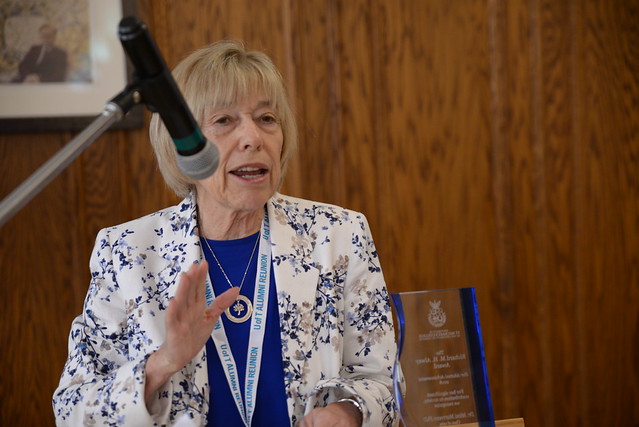
Dr. Mimi Marrocco (Class of 1969) has received the 2019 Alway Award, an honour in recognition of her decades of service and important contributions to the life and reputation of the College. As her former students and colleagues attest, her work—especially in the area of Continuing Education—has influenced the lives of thousands of people.
Former University of St. Michael’s College President Sr. Anne Anderson, CSJ said Dr. Marrocco “gifted USMC with her passion for Continuing Education.” That passion, Sr. Anne said, yielded “innovative, cutting-edge programs across a broad spectrum of interests,” including “our internationally known Certificate in Corporate Social Responsibility.”
Over 300 participants from across Canada and over 20 countries have gone through the CSR program, and over 250 alumni from the program hold positions as VP, Director, or Manager in CSR and Sustainability capacities.
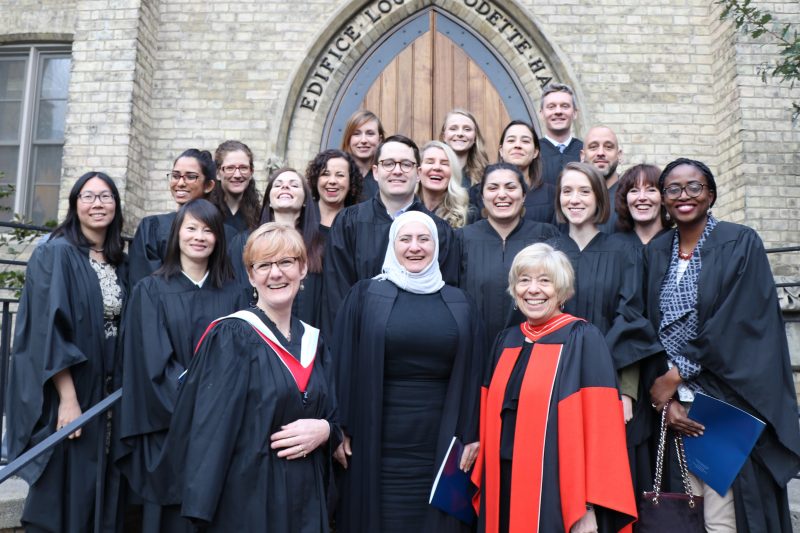
“Mimi is the heart and soul of the CSR Certificate Program,” CSR Program Manager Kathryn Cooper said. She described Dr. Marrocco’s contribution to the field in Canada as decisive: “Dr. Marrocco developed an innovative collaboration with the Conference Board of Canada to launch in 2002 the first program providing executive education in the field of Corporate Social Responsibility. This program created the platform for the very first developments of the body of knowledge, best practices, mentorship and action learning projects in business for Corporate Social Responsibility.”
As the first recognized, professional University Credential in Canada related to CSR, the St. Michael’s program Dr. Marrocco founded has also created a network of alumni and mentors in the field. Program participants receive mentorship support for 13 months, which helps them achieve first-time success in implementing the CSR/Sustainability projects they undertake during the program. To date, participants have implemented over 200 action-learning projects at their companies and organizations, including numerous CSR, Sustainability and Community Investment strategies.
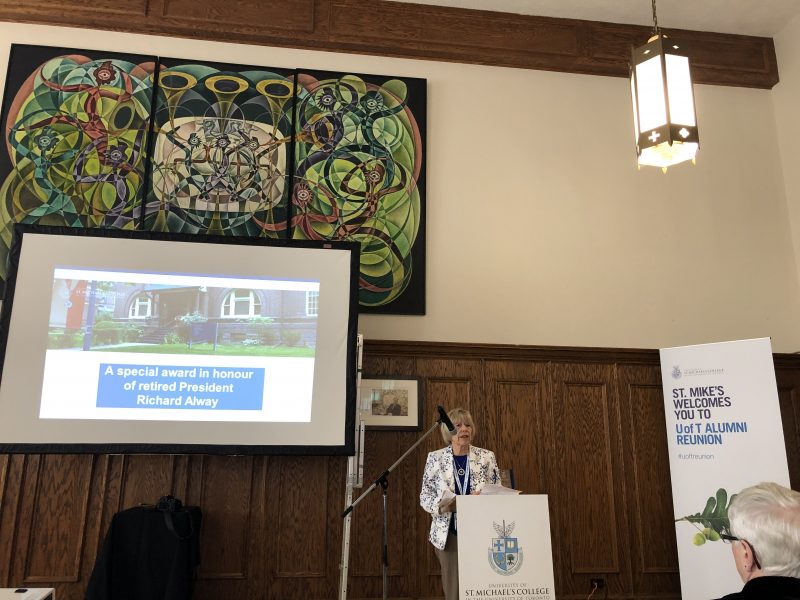
Dr. Marrocco’s former students describe her as a dynamic leader whose talent for teaching is matched by her care for them. “Mimi is so lovely and insightful,” said one, while another said that Dr. Marrocco “has been instrumental in helping me to open my mind to different perspectives.”
After earning a BA from St. Mike’s, Dr. Marrocco received an MA in 1970 and a PhD in 1978, both from the U of T, where she later taught as a member of the English Department. Dr. Marrocco worked for over a quarter century as Director of Continuing Education at St. Michael’s, and served as faculty leader for the CSR Certificate program.
An industry leader as well as an educator, Dr. Marrocco has served on academic and community boards, including stints as president of both the Ontario Council for Lifelong Learning and the Canadian Association of University Continuing Education.
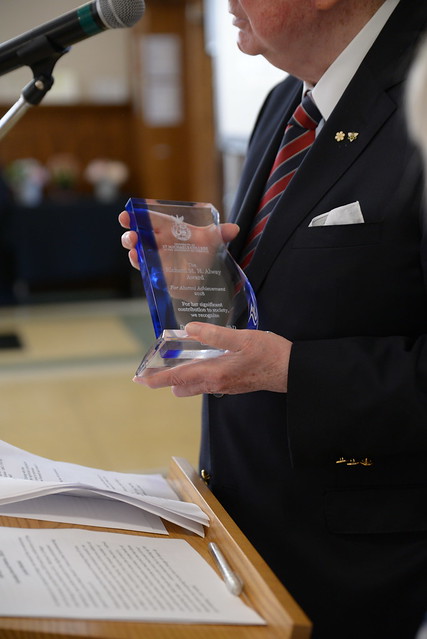
She has served in many roles for Catholic educational and charitable institutions, and she continues to serve in board and/or committee member roles with organizations such as the Arts and Letters Club or Toronto, the Toronto Hunt Club, and the Advisory Committee of the Canadian Business Ethics Research Network at York University.
Named for past St. Michael’s President Dr. Richard Alway, a member of the USMC Class of 1962 and our first lay president, the Alway Award is given in recognition of alumni whose significant contributions to society bring esteem to them and to the College.
For her pioneering work in the field of Continuing Education in Canada, for her support of the mission of the University of St. Michael’s College, for the way she has helped shape the lives of her students, and for her many other achievements, St. Michael’s is proud to call Dr. Mimi Marrocco one of its own. The Alway Award is a small token of the College’s gratitude for her life and work.


